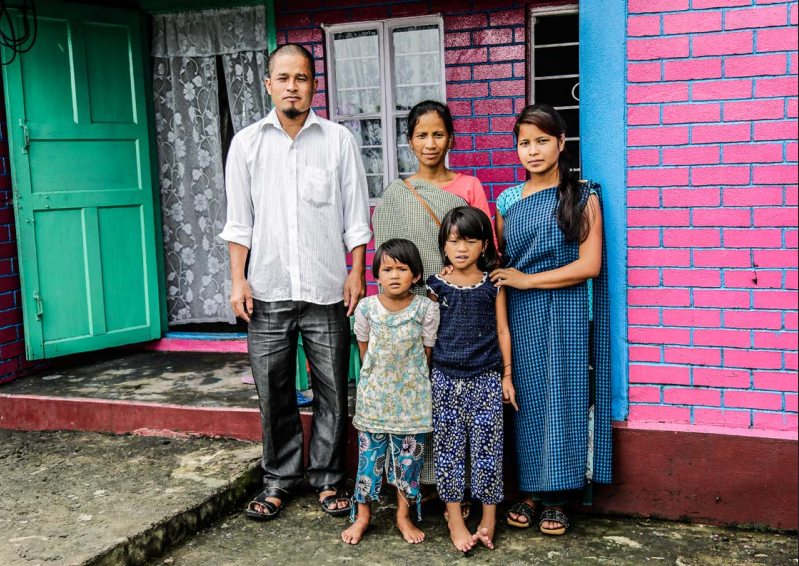
Neta Pohthmi is known in his village for being cheerful and positive, and for always being optimistic about everything in life. The Padu Village local lives with his wife and their three
children. Having had no access to formal education, he worked as a farmer and later as a shopkeeper where he sold biscuits. His life, however, changed after he decided to become a
partner with the Meghalaya Basin development Authority (MBDA).
Neta first heard about MBDA from a fellow Padu resident who works at MBDA’s Enterprise Facilitation Centre (EFC) at Amlarem. He learned about the many activities that were available under MBDA and was attracted by the various training programmes and workshops on Food Processing which were being facilitated by MBDA. So, he visited the EFC for registration.
A key reason behind him picking food processing as a livelihood activity was the attachment he felt towards food as he was himself a former shopkeeper. In May 2015, he was selected to undergo three-day training on Food Processing at the Rural Resource and Training Centre, in Umran, Ri- Bhoi, that was organised by MBDA. On completing the training, Neta was initially hesitant to embark on this new pursuit, not knowing whether he would be able to pull it off. However, he decided to cast his doubts aside and went ahead with this new venture.
In 2016, Neta began his journey by building his own food processing unit at his village on a plot of land owned by his family. To pay for the construction of this unit, he took a loan through the MUDRA scheme of the government and spent approximately fifty thousand rupees on construction. The completed unit is a semi-kutcha type of infrastructure with one single room in which all the processing including preparation, sealing, packaging, and labelling are done.Though the space was small, it was enough for Neta who worked alone, because back then he could not afford hiring another person to help him.
Instead he relied on the skills which he had gained through the trainings. Neta admitted that there were many mistakes made working alone, but added that those mistakes helped shape him as an entrepreneur and helped improve his enterprise. He conceded though that there were losses in terms of wastage of items and commodities because of those mistakes.
As time passed, Neta’s enterprise grew and he was able to buy new machinery like sealing machines, a blowgun for packaging, utensils for preparing food items, a mini water storage tank and a weighing machine. He was also able to afford a reliable electricity connection for his unit and was able to engage two people on daily wage, twice a week, and whenever work requires. Neta’s primary product is Aachar which comes in many varieties such as jackfruit, gooseberry, muli (raddish), bamboo shoot and local fruits. Depending upon the quantity and the type of packaging used, each aachar is priced differently. For example, a hundred grams of aachar packed in plastic packaging sells for thirty five rupees while two hundred grams of aachar packed in plastic containers sells for eighty rupees.
Besides plant based aachar, Neta also processes meat aachar using chicken and fish. These are priced slightly higher at a hundred rupees per packet but are produced in a smaller
quantities when compared to his plant based aachar.
Like many local enterprises that are in their initial stages of starting up, Neta acquires his customers by meeting them in person. He has travelled to many places including Jowai,
Amlarem, Dawki, Ummulong, Mookyndur and others, often visiting several localities at a time and selling his products directly to customers and to shops. His goal is to travel twice in a month and to sell everything that he produces in those travels, which amounts to about a hundred to two hundred packets of sales per day. The demand ranges between a minimum of six to nine pieces up to a maximum of two to three dozen per customer. So far, he has sold close to five thousand packets which he is quite happy about.
Owing to his success, Neta has been invited by MBDA on several occasions to serve as a Resource Person in programmes and workshops conducted in neighbouring villages, where he can motivate, inspire and guide aspiring entrepreneurs.
Today, Neta is recognised not only within his own village but also in the neighbouring villages of Padu where he is considered a role model to young and aspiring entrepreneurs.
He considers his decision to register as a partner of MBDA at the EFC to be one of the best he has ever made despite his initial reservations about the food processing business and his own ability. In fact, because of this success, he now plans to expand his processing business by venturing into juice and candy making. He hopes that his success will be an example for others and motivate them to pursue their dreams and persevere until they too achieve success.